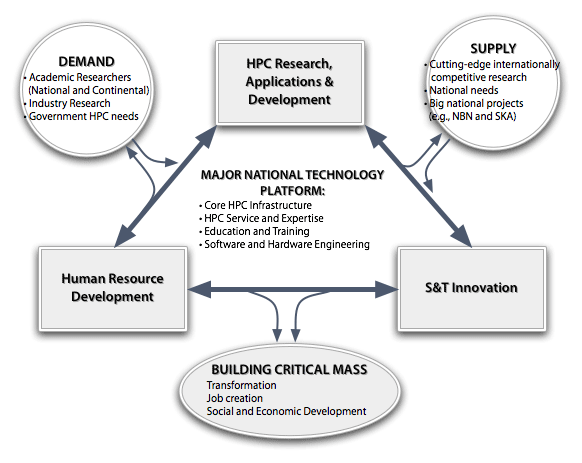Global trends in the development of CHPCs have given strong impetus to plans to establish a CHPC in South Africa. The CHPC will function as a major national innovation platform, which is set to deliver a significant return on investment for the country, by
- stimulating and channelling scientific and technological innovation for economic development,
- driving the development of highly skilled human ICT capacity for transformation,
- harnessing the application of HPC for a positive social impact, and
- promoting the industrial exploitation of HPC and enabling local, export-driven industries.

The core CHPC facility will be established in Cape Town, with the University of Cape Town designated as its formal host. The considerable existing strengths in scientific computing at various research institutes in South Africa form a large pool of expertise on which the CHPC will be based. Indeed, planning for the establishment of a CHPC began in Western Cape universities with a group of researchers in areas such as computational chemistry, grid computing in theoretical physics, climate modelling, bioinformatics, computational mechanics, radar signal processing and machine vision. Since assuming national proportions, the pool of expertise in scientific computing and HPC has been expanded, for example to include groups in computational physics at universities in Limpopo and Kwazulu-Natal provinces.
To ensure the development of expertise in a truly national fashion and to mitigate the drawbacks of a centrally located national facility, it is planned to establish regional nodes at a number of centres in South Africa. Far from being clones of the central CHPC, these will typically comprise small clusters, with a capacity of not greater than 1/20 of that of the parent facility, which will permit at a local level the initiation of research projects with an HPC dimension, as well as facilitating education and training in HPC. Access to the main CHPC is nevertheless a central plank in the planning, and regional centres will simultaneously have remote access to the central facility.
Although the CHPC will provide an HPC environment that is fully functional as a stand-alone unit, connectivity of the national research institutions to the CHPC, as well as international connectivity to global networks, will have a significant impact on its role as a national resource and ease of access, as well as its reputation as a global player in the field of HPC. The CHPC will require bandwidth of at least 10Mb/s for national, and at least 155Mb/s for international, connectivity. The high cost of bandwidth is seen as a significant regulatory constraint, which currently inhibits the development of particularly networked high performance computing.
It is hoped that national high-bandwidth connectivity between CHPC member institutions across the country can be realised through the government's SANReN (South African National Research Network) initiative. The CHPC will also strive to provide South African researchers with the necessary international connectivity to participate in, benefit from, and contribute to global research activities. An agreement or partnership with Telkom, the national telecommunications company, leading to a donation (or at least an affordable supply) of the required national and international connectivity, will be negotiated.






